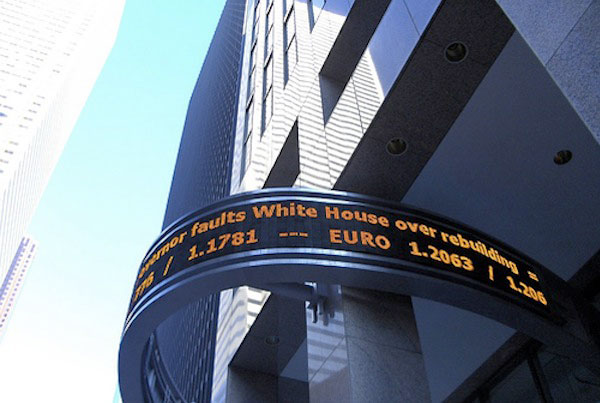
Photo by: bgilliard.
News ticker at the Reuters building.
Meetings of the Industrial Development Agency – the city agency in charge of approving discretionary tax subsidies to local businesses – are generally sleepy affairs. Unless sports teams are involved, the monthly board meetings typically attract a handful of business executives and policy wonks but little public attention.
This morning’s monthly IDA hearing, though, was widely anticipated for a different reason: One of the items on the agenda was $24 million in sales tax breaks on office and building materials to Thomson Reuters, the news-and-information-services giant created when the Canadian firm Thomson bought the wire service Reuters in 2008. Ten years earlier, Reuters had gotten approval for $26 million in tax breaks from the Giuliani Administration, but never used most of them, in large part because it never met its goal of maintaining 1,800 workers in the city. The new proposal would essentially tear up Thomson Reuters’ old deal and set out a new job goal of 3,744 workers; if it falls short, it would forfeit some of the cash, and if it exceeds that threshold it would be eligible for bonus credits.
The added attention was not because of the subsidy proposal, which is unremarkable in the annals of city tax breaks. Rather, it was because Thomson Reuters is in the midst of a labor dispute with the Newspaper Guild: This January, the company unilaterally declared an impasse in contract talks, and imposed a set of pay cuts (including no longer paying extra for off-hours work) and new work rules that “are aimed at nothing less than eliminating the Guild as the employees’ representative,” according to Chris Shelton, vice-president of District 1 of the Communications Workers of America, the Guild’s parent union. The Guild currently has an unfair labor practice charge filed with the National Labor Relations Board against Thomson Reuters.
Yesterday, public advocate Bill de Blasio and councilmembers James Sanders and Margaret Chin held a press conference on the steps of City Hall calling on the IDA to spike the Thomson Reuters tax breaks, with de Blasio asserting, “Looking at what’s happening to our economy, looking at what’s happening to government budgets everywhere, we’ve got to get more return for investment.”
None of these elected officials showed up at the IDA hearing, leaving it to Shelton to state the case against the deal. “Thomson Reuters shouldn’t be rewarded for losing jobs, not creating jobs,” he told the IDA board.”And that’s what Thomson Reuters has done over the years.” (Thomson Reuters said this was largely because the company had divested itself of a New York-based subsidiary, which no longer counts toward its job count.) Guild president Bill O’Meara added that Reuters has been at the forefront of outsourcing journalism jobs, earning notoriety for hiring reporters in Bangalore to cover Wall Street.
When Economic Development Corporation president Seth Pinsky noted that the new deal would require Thomson Reuters to adhere to any resolution of the NLRB dispute, Shelton replied: “Under federal law they would have to abide by them. So they’re giving you ice in the winter.”
In his testimony, Thomson Reuters marketing president for the Americas Chris Perry said the new deal is needed to “get the commitment of the merged company to stay in New York City.” He added: “We have several unused facilities that include Stamford, Connecticut, Hauppauge, New York, Nutley, New Jersey, and Jersey City, all of which are available to look at as options,” and complained that the IDA shouldn’t listen to “attempts to transform this proceeding into a referendum on a private labor dispute.”
When Kevin Doyle, Manhattan borough president Scott Stringer’s IDA representative, pressed Perry on whether labor disputes weren’t relevant to subsidy decisions, whether labor disputes should be considered, he replied: “This is about our commitment to the city. We’re trying to work with the city at a very difficult economic time.” Failing to approve the subsidy, Perry said, “will cause us to re-look at our real estate strategy.”
Subtract the labor dispute, then, and the Thomson Reuters deal is just another skirmish in what Minneapolis Federal Reserve vice-president Arthur Rolnick dubbed “the economic war among the states,” the decades-long battle in which local governments try to outbid each other in luring companies to relocate or remain on their side of the state line. That only came up, though, aside from a brief mention in the testimony of Bettina Damiani of the subsidy-watch group Good Jobs New York, who said that in interstate relocation fights, “the only groups that win are the site consultants and the companies.”
At today’s hearing, the IDA also considered tax breaks of $1.6 million to a Long Island City furniture manufacturer to expand its space, $429,000 in aid for building an Associated supermarket in an underserved portion of Morrisania – and a sales-tax exemption for the accounting giant Deloitte LLP that could be worth anywhere from $10.6 million to $21 million.
The Deloitte subsidy is just as worthy of major scrutiny as the Thomson Reuters one, says Damiani. “This is exactly what Bloomberg said he wouldn’t be doing,” she said after the meeting. “You’re going to tell me a multi-billion-dollar firm is going to grow because you gave them $21 million over 20 years?”
The IDA is scheduled to vote on the Thomson Reuters deal, and the other proposals presented today, on Tuesday.







